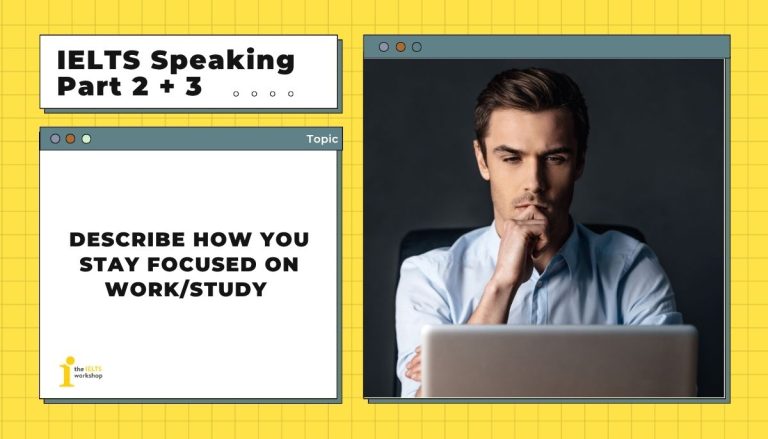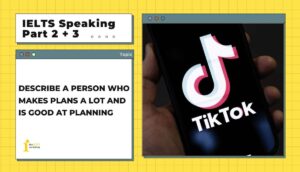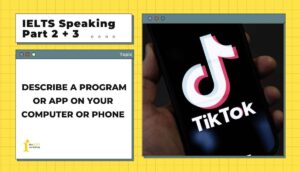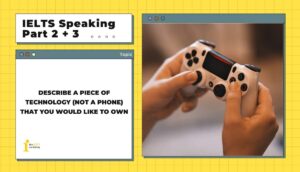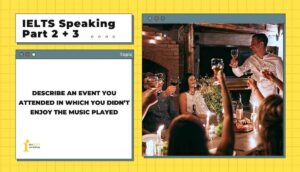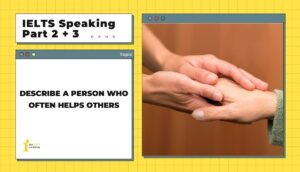Trong bài giải mẫu lần này, thầy Bùi Hoàng Anh của The IELTS Workshop sẽ hướng dẫn bạn trả lời topic Describe how you stay focused on work/study trong IELTS Speaking Part 2. Cùng tham khảo sample, từ vựng và một vài cách diễn đạt ghi điểm trong phần thi IELTS Speaking nhé.
Part 2: Describe how you stay focused on work/study
You should say:
- What it is
- How it helps you concentrate
- When you do it
- And explain how you feel about it
1. Bài mẫu (Sample)
One practice I follow religiously to better focus on the work/study tasks at hand is my daily ‘deep work’ time. Essentially, it is an extended period, usually about 3 hours, in a day when I retreat into my home office, locking myself in it to tackle work/study with undivided attention.
A bit of background: earlier this year, I was chronically distracted while at work/studying. There were days when I resolved to be productive first in the morning, but didn’t manage to complete anything in the end. The reason my plans fell through was that distractions were in the presence. I remember reaching for my phone and tinkering with the settings every few minutes as it gave me new suggestions through the notifications. I also often got sidetracked by long, juicy gossip with people around, the result of which was I lost my train of thoughts and had to keep re-reading the papers. Conscious of this root cause, I chose to physically tear myself away from distractions, hence the development of ‘deep work’ time as my ritual.
Process-wise, I hunker down in my work/study room. The wall is insulated to block outside noises, or at least muffle them to be barely audible; my phone is put on silent and out of sight. I then give myself a hard deadline, including measurable metrics such as the number of words produced per 20-25 mins. If I revert back to my old way, such as daydreaming, I would discipline myself, diverting time from leisure, even forgoing it, to keep at the work/study tasks until they are done.
The initiative has proven effective in giving me a distraction-free environment. As well, the protocol, having zero tolerance for the loss of concentration, is a powerful warning against it for myself. I always feel pleased and accomplished when implementing the process, like last month I was so immersed in drafting my dissertation that I broke through writer’s block, my ideas flowing continuously.
Sample by Bui Hoang Anh, IELTS Teacher at The IELTS Workshop
2. Từ vựng (Vocabulary)
- Deep work – làm việc sâu, tập trung cao độ
- Undivided attention – sự tập trung hoàn toàn
- Gossip – chuyện tầm phào
- Ritual – thói quen thường lệ
- Daydreaming – mơ màng, mộng mơ
- Leisure – thời gian rảnh
- Initiative – sáng kiến
- Dissertation – luận văn
- Hunker down – tập trung làm việc
- Sidetracked – bị phân tâm
Xem thêm: Topic: Place of work/study | IELTS Speaking Part 1
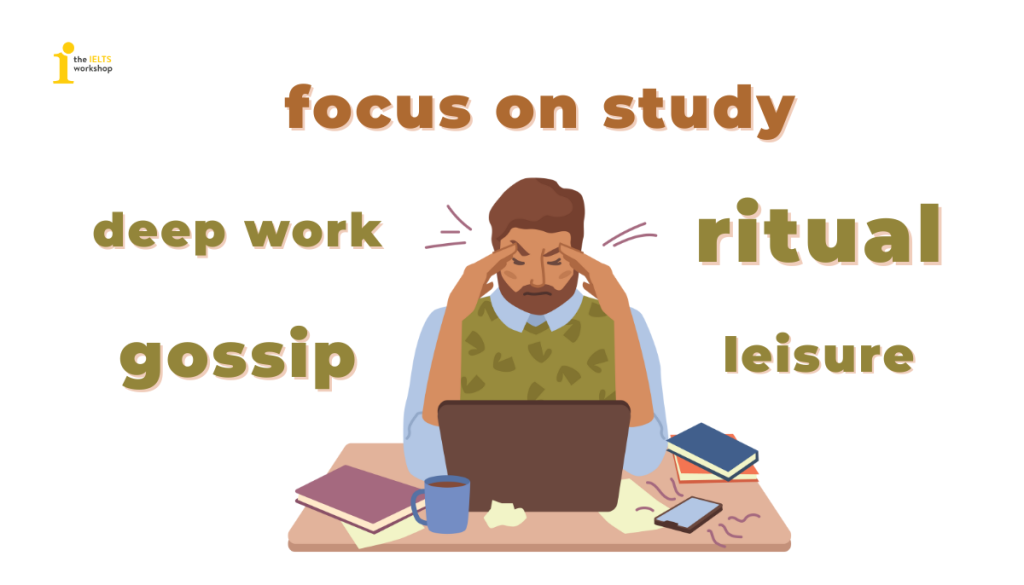
Part 3:
1. What can people do to improve their ability to concentrate?
Apart from what I mentioned in part 2, with the exception of activities that can be performed without thinking, say folding clothes, people should avoid multi-tasking. In these situations, active attention needs to be on only one task at a time, the way human brains are hardwired. Such opportunities, however, are denied by doing different tasks at once, since attention would be shifted between them.
Từ vựng:
- Folding clothes – gấp quần áo
- Multi-tasking – làm nhiều việc cùng lúc
- Hardwired – được lập trình sẵn (trong não)
- Shifted – bị chuyển hướng
2. Is it important for children to concentrate on their studies? Why?
Ideally, yes, otherwise their mistakes from inattention would soar, adding to the higher overall error rates. Nevertheless, young children may not be able to listen intently to their teachers’ words for long, given their short attention spans, a feature that is developmentally normal for their ages. Perhaps the question should be how learning experiences can be designed to fully capture their attention.
Từ vựng:
- Soar – tăng vọt
- Intently – chăm chú
- Developmentally – theo sự phát triển
- Capture – thu hút
3. Can exercise help people improve concentration?
I think it certainly can! Apart from giving participants a good appetite, meaning they would eat more, and their brains would in turn have more energy to function, exercise can be a break from study/work, after which the mind is revitalized, a more conducive state for people to be laser-focused.
Từ vựng:
- Revitalized – được làm mới, phục hồi năng lượng
- Conducive – tạo điều kiện thuận lợi
4. What kinds of jobs require high concentration at work?
One line of work that demands intense concentration is accountants. As they crunch numbers connected to money, even the slightest oversights due to attention drift can carry grave risks, such as losing their paychecks to compensate for undercharging clients. Another profession where high concentration is a must is drivers. One moment they don’t look at the road and it could be fatal, such as plowing into and running over pedestrians.
Từ vựng:
- Crunch (numbers) – tính toán (con số)
- Oversights – sự sơ suất
- Plowing into – lao vào (một cách nguy hiểm)
5. Do you think technology will harm children’s ability to concentrate?
I don’t think it is always the case. Granted, some communication technology such as livestreams would be responsible for impairing children’s ability to focus. It sends updates to these young users in a matter of seconds, compounding their ‘fear of missing out’, the consequence being they are perpetually preoccupied with staying on top of the real-time chats. That said, there has been the proliferation of apps aiding concentration, such as those disabling game software when the young ones are in a study time block.
Từ vựng:
- Proliferation – sự gia tăng nhanh chóng
- Granted – thừa nhận (mặc dù…)
- Compounding – làm trầm trọng thêm
- Preoccupied – bị bận tâm
Từ vựng mở rộng theo chủ đề
- Attention span – khoảng thời gian có thể tập trung
- Distraction – sự xao nhãng
- Mental clarity – sự minh mẫn trong tư duy
- Zone out – mất tập trung, lơ đãng
- Drift off – trôi đi, lơ mơ (mất tập trung)
- Mind-wandering – tâm trí lang thang
- Cognitive load – tải nhận thức (khối lượng thông tin não phải xử lý)
- Focus-enhancing – tăng cường sự tập trung
- Short-circuit (v) – làm gián đoạn đột ngột (quá trình tư duy)
- Laser-focused – cực kỳ tập trung
- Mental fatigue – sự mệt mỏi tinh thần
- Overstimulated – bị kích thích quá mức (khó tập trung)
- Repetitive task – công việc lặp đi lặp lại
- Sustain attention – duy trì sự tập trung
- Eliminate distractions – loại bỏ yếu tố gây xao nhãng
Tạm kết
Hi vọng bài mẫu trên đã mang đến cho bạn một góc nhìn rõ ràng hơn về cách xử lý chủ đề Describe how you stay focused on work/study trong IELTS Speaking Part 2 + 3
Để luyện nói hiệu quả hơn, bạn có thể kết hợp thực hành đa dạng chủ đề và tham khảo thêm các nguồn học chất lượng như KHO BÀI MẪU IELTS SPEAKING và Bộ đề dự đoán IELTS Speaking Quý 2 (T6 – 08/2025) – Full 3 Parts.
Đừng bỏ lỡ cơ hội HỌC IELTS MIỄN PHÍ cùng các giáo viên tại The IELTS Workshop – đăng ký ngay hôm nay nhé!


